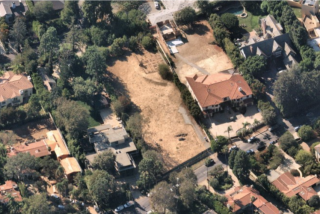PRIVATE FACES, PUBLIC SPACES : A Life Lived Outside a Thousand Windows
- Share via
Frank Ceballes, gardener: calloused, awkward hands, dusty old truck, well-worn mowers and blowers, and always a helper or two with little English. Mexican, perhaps? From farther south? Poor, untiring, always smiling: the good servant. Frank Ceballes grew used to being taken for other than he was.
Until his death, he tended a hundred gardens and more, Alhambra to San Marino. In the hot weather, people sometimes offered a glass of water, even a sympathetic smile. The hired help is never expected to grow old, to grow tired. He was past 70 when he died, and impatient voices intruded in the darkened house in El Sereno: “Where’s Frank?” “Why didn’t he show up?”
He was thought to be a poor, unworldly man. When he died, he was seen to have the greatest of riches: hundreds of friends and family who carried him to his grave and delivered him to the glory of the Lord. In a city in which many go alone into death, Frank Ceballes filled a church on a Friday morning.
Tall, saddened men, uncomfortable in their suits. Women of all ages, ablaze in color, full of tears, faces torn with memories. A baby cried; a friar who had known him for 20 years tried in his broken English to bring comfort--and brought instead the mystery of life into the plain church with its vaulted roof.
“Get an education,” this kind, shy man often told his only son. “Be somebody. Then people won’t talk to you as if you’re a domestic.” His son calls him a “sweetheart” and “a gentleman--a true gentle man.” They worked together every weekend, all summer, from the time he was a boy. Pictures he carries within: driving home, past dark, falling asleep with his head on his father’s lap, and his father’s huge, rough hand stroking his hair. The client on Lowell Avenue who screamed curses at the frightened 12-year-old for “ruining my roses.” And his father, who never grew angry, pounded on that kitchen door, demanding an apology.
Every weekend and all summer from the time he was a boy, he and his father bought olives, fresh bread, salami, spicy ham, provolone, and they would stop somewhere quiet and feast and talk for hours. The banquets and feasts of life that others never saw, deceived by the worn working clothes and dusty old truck.
His father was one of 11, his mother one of 13. The boy grew up in a palace, or so he thought. “I was the only boy in El Sereno who went to school with starched and ironed pants. Every day.”
Tales he grew up on: his grandfather’s ranch in Trinidad, Colo.: hundreds of acres across which a man could ride that were his own. The pickup truck that clattered across half a country during the Depression, bearing brothers, sisters-in-law, nephews, friends--away from hunger and failed crops, toward dreams that ended with another pickup truck and the old gardening tools.
Tales of those who came before: Basques and Castilians, Spaniards all, the noblest of Europe, with the ancient, canny, dark eyes of a people who had withstood the Moors, the Inquisition, wars and empire. Three and four generations as Americans could not remove the dense history of centuries.
But Frank Ceballes was the last. His only son, the college graduate, started a nursery and found a world of business cards and contracts, of smooth Ralph Lauren shirts, soft tweed jackets. A clean-cut Orange County life that no longer includes the old ways, the old language, the glory of the Lord.
Yet his son mourns it and grieves for that life, as he does for the father he has lost. For the simple house in El Sereno, the roses and gladioli raised in the front yard before the gangs and graffiti spilled onto its walls. The vegetable patch, the earth his father turned over in the dark evenings when he came home from work.
“This beautiful, gentle man--my dad. There wasn’t anything my father didn’t know about me, and anything I didn’t know about my father.”
Frank Ceballes, gardener. He passed through other lives, taken for granted through the kitchen window. And the meek shall inherit the earth.
More to Read
Sign up for Essential California
The most important California stories and recommendations in your inbox every morning.
You may occasionally receive promotional content from the Los Angeles Times.










